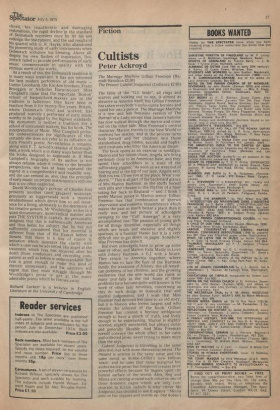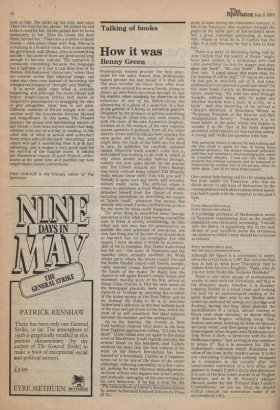Cultists Peter Ackroyd
The Marriage Machine Gillian Freeman (Hamish Hamilton £3.50) The Present Gabriel Josipovici (Gollancz £2.95) The fable of the "G.I. bride", all rings and scarves and looking out to sea, is almost as abrasive as America itself, but Gillian Freeman has taken everybody's unfavourite heroine and tuned her into a person. The Marriage Machine is a new and less feminine version of The Portrait of a Lady, except that James's heroine has now walked through the mirror and come out on the other side: Miss Freeman's central character, Marion, travels to the New World to confront her destiny, and in the process turns both herself and her children into those standardised, drug-ridden, suicidal and haphazard creatures who litter the American dream. The book opens as an exercise in nostalgia. Marion and her lissom chum, Angela, are living perilously close to an American base, and they spend their schooldays in a state of the suffocating giggles: "As soon as we were out of hearing and at the top of our lane, Angela said, 'Bolt you tea. I'll see you at my place. Wear your shorts.' "This is all part of the backward glance of Mrs Marion Hartman, as she stuffs herself with pills and vibrates to the rhythm of a liner taking her back to England and I think I prefer Marion junior to Marion senior. Gillian Freeman has that combination of shrewd observation and romantic remembrance which makes the past so much better a place than it really was, and her picture of schoolgirls swinging to the "Cult Amerigo" is a very accomplished one. The passion of young girls for all things American, expecially all things which are brash and abrasive and slightly spurious, is a familiar theme but it is a very difficult one to get down on paper. Somehow, Miss Freeman has done it. But even schoolgirls have to grow up some time or other, and Marion Falls Madly in Love with Johnny Hartman, a G.I. with a future. They return to America together, where Marion has to face the fury of the Hartman family, the weakness of Johnny, the all-American problems of her children, and the growing realisation that the new world can cause as many prat-falls as the old. Some of these problems have become quite well-known in the work of other lady novelists, concerning as they do such things as domestic trial and marital judgements, and I wish that Miss Freeman had devoted less time to an old story, but it is Marion who looms largest and who retains the interest of the book. Gillian Freeman has created a heroine ambiguous enough to have a smack of truth, and lively enough to be entertaining. Marion is slightly worried, slightly smothered, but always ironic and generally likeable. And Miss Freeman herself conveys the whole effect in her calm and collected prose, never trying to mean more than she says. Gabriel Josipovici is travelling in the same direction, but with more theoretical intent. The Present is written in the same tense and the same mood as Robbe-Grillet's now tedious 'texts', and he uses that same marginal but authoritative prose, but Josipovici creates more powerful effects because he lingers upon the human surface of the world. Alex, Reg and Minna are circling around each other in one of
those domestic cages which are only constructed in fiction (which is why clever Mr Josipovici has decided to use it again): "Minna puts on her slippers and stands up. She doesn't
look at him. She picks up the tray and says. 'Open the door for me, please.' He jumps up and holds it open for her. As she passes him he bows elaborately to her. Then he closes the door firmly behind her." There are a number of small scenes — Alex plays chess with Reg, Minna is screaming in a hospital ward, Alex is discussing. his girl-friends with Minna, Alex is committing suicide — but none of them are protracted long enough to become tedious. The narrative is constantly interesting, because the language has a lightness to it and it can float free of its themes. Old-fashioned 'characters,' when they are created within this elliptical range, can come into their own instead of becoming the transparent integers of 'thought' and 'feeling'.
It is never quite clear what is actually happening, and although the more robust and hearty Anglo-Saxon critics will sneer at Josipovici's presumption in scrapping the idea of plot altogether, their loss is our gain. Different varieties of fiction mingle with one another until the boundaries become blurred and insignificant. In this sense, The Present displays the actual and bewildering nature of any fiction — how does anyone make that leap, whether it be one of writing or reading, to the other side of what is actual and everyday? Some critics will call this book "disturbing" and others will call it something else; it is in fact refreshing, and it makes a very good case for the survival of the English novel. It adopts the theoretical stance of poor French orthodoxies at the same time as it purifies our now turgid Anglo-Saxon conventions.
Peter Ackroyd is the literary editor of The Spectator



































 Previous page
Previous page